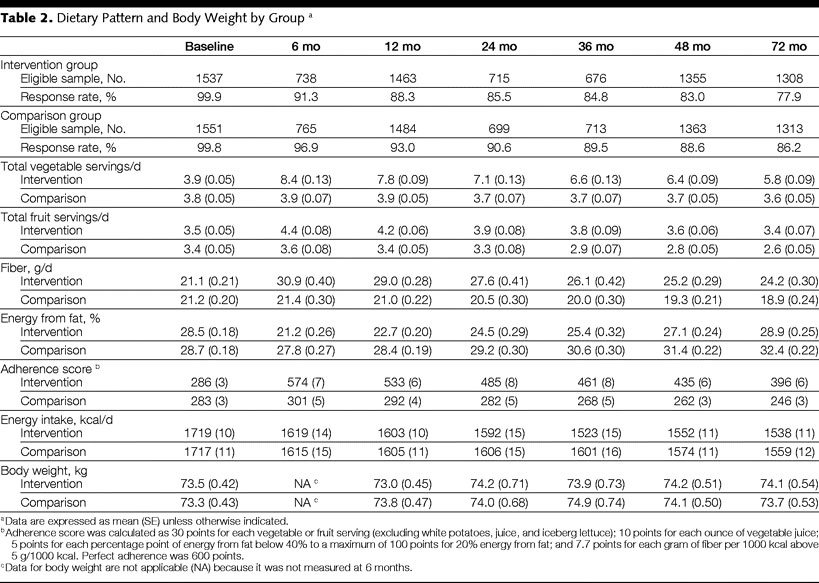|

Study Fails
to Show Benefits of Fruits and Veggies for
Breast Cancer Patients - Women are Blamed, but
the Investigators Were at Fault
The meat and dairy
industry must have been laughing all the way to
the bank on Tuesday July 17, 2007 when headlines
worldwide announced the results of a seven-year
diet experiment, known as The Women’s Healthy
Eating and Living (WHEL) Randomized Trial, of
more than 3,000 women with breast cancer. This
government funded study (kicked off by a $5
million grant from the late Wal-Mart heir John
Walton with an additional $30 million in support
from the National Cancer Institute) found no
benefit from recommending that women with breast
cancer eat more fruits and vegetables, and less
fat. The chances of fewer recurrences and
better survival were not seen in women
previously treated for breast cancer after
changes in diet achieved during this study. As
a result of this paper, originally published in
the Journal of the American Medical
Association, more people now believe
healthier eating will not help women prevent or
treat breast cancer.
Incontrovertible Facts Show Women Made Few
Changes
Data collected by
asking the study participants about what they
ate suggested they were eating more fruits and
vegetables and less fat after being given
instructions dictated by the study guidelines.
But people don’t always tell the truth—they
often want to please the investigators, so they
tell them what they think they want to hear,
which in this case was clearly inaccurate.
The women
described as eating “a dietary pattern very high
in vegetables, fruit, and fiber and low in fat”
did not lose any body weight at any time during
the study—in fact, they gained a small amount.
They were, on average, obese at 161.7 pounds
(73.5 Kg) when they began the study and 6 years
later they were still obese, weighing 163 pounds
(74.1 Kg). (See below, table 2: Dietary Pattern
and Body Weight by Group.) Nor did their
average weights differ from the women who were
not advised to change their diet (the control
group).
Proof that the
data collected from asking the women what they
ate was inaccurate is shown in table 2. The
women eating “a dietary pattern very high in
vegetables, fruit, and fiber and low in fat”
were reported to have decreased their daily
calorie intake by an average of 181 calories
(1719 initially, and 1538 six years later), yet
they gained weight. At every sixth month data
collection they reported consuming at least 100
fewer calories daily than before the experiment
began. A 100-calorie-plus daily deficit over a
month would cause a one pound weight loss, over
a year that would be 12 pounds, and over the
entire 6 years of study the women should have
achieved trim body weight. They gained weight!
Looking over table
2 you will also see the differences in foods
consumed between the two groups were caused by
the control group reporting that they ate less
fruit and more fat over the study period—not by
any improvement in the intervention group’s
diet, other than 2 more vegetable servings a
day. Yet, rather then writing about the minor
absolute changes in the diet made by the
intervention group, they boasted of the
relative differences between the
intervention and control groups—reporting
impressive figures like: “At 4 years, relative
differences in mean intake between study groups
were +65% for vegetable servings, +25% for fruit
servings, +30% for fiber, and −13% for energy
intake from fat.

Pierce, J. P. et al. JAMA
2007;298:289-298.
Copyright restrictions may apply. JAMA
The Authors
Deceived the Public
Fraud is
intentional deception resulting in injury to
another person. They deceived the public by
claiming they were able to cause the “adoption
of a dietary pattern very high in vegetables,
fruit, and fiber and low in fat.”
Their
concluding statement was, “… during a mean
7.3-year follow-up, we found no evidence that
adoption of a dietary pattern very high in
vegetables, fruit, and fiber and low in fat vs a
5-a-day fruit and vegetable diet prevents breast
cancer recurrence or death among women with
previously treated early stage breast cancer.”
These words reflect the tone of the entire
article—one of a successful experiment, not a
failure—and led the public and press to believe
that women in the intervention group made
substantial changes in their diet. The result
was headlines like: “No Cancer Benefit Found In
Mega-Veggie-Diet Study,” “Dietary Hopes Dashed
for Breast Cancer Patients,” “Intensive Diet
Doesn't Prevent Breast Cancer: Study,”
“Healthiest Diet Made Little Difference to
Breast Cancer Survivors,” and “Fruits,
Veggies Don't Stop Cancer Return.” But the
conscientious reader studies table 2 and
correctly concludes: Even if the data reported
were an accurate reflection of what these women
did, two more vegetables servings a day is not a
diet “very high in vegetables, fruit, and fiber
and low in fat.”
Neither lack of
intelligence nor carelessness caused the report
to be written in a manner that led the public
and press to incorrect conclusions; I believe
the authors intentionally deceived the public.
One possible motivation for distorting the truth
was to save face. They wasted $35 million
dollars by feeding women with breast cancer an
ineffective diet. Rather than admit their
mistakes, they chose to distort the real meaning
of the findings of their study, and effectually,
deprive women of an opportunity to become
healthier by eating more fruits and vegetables.
Sixty years of
scientific research, involving tens of thousands
of published articles, has identified the rich
Western diet as the cause of breast cancer and
many scientific studies have shown that a
meaningful change in diet will allow women with
breast cancer to live longer and healthier.
Yet, one poorly-executed, well-publicized, study
may turn the tide for better health for women.
When Asked,
Women Will Change
Breast cancer is a
fatal disease and women will do almost anything
to live. They will endure poisoning by toxic
chemotherapy, burning with radiation, and
mutilation from breast-amputating mastectomy; in
the hopes of living a few more days. Obviously,
if asked to do so, and given proper support from
their doctors and dietitians, they would do
something as simple, safe, cost-effective, and
enjoyable as eating oatmeal and bean burritos
while avoiding beefsteaks and cheese omelets. In
The Women’s Healthy Eating and Living (WHEL)
Randomized Trial they continued the same meat-,
dairy-, oil-, and environmental chemical-laden
diet that got them in trouble in the first
place, with minor modifications. The
investigators, not the women, should be held
responsible for the fact that even the
instructions to eat, “5 vegetable servings plus
16 oz of vegetable juice; 3 fruit servings; 30 g
of fiber; and 15% to 20% of energy intake from
fat,” were followed poorly. The full
cancer-inhibiting benefits of low-fat,
plant-foods were never offered to these women.
A true test of
diet for the prevention and treatment of breast
cancer would follow the model of the diet of
women worldwide who have the least chance of
contracting breast cancer and the best chance of
surviving it. These are women who follow a diet
based on starches, like from rural Asia (rice),
Africa (millet), Mexico (corn), New Guinea
(sweet potatoes) and Peru (potatoes). The few
women, who do get breast cancer in these
societies, also live longer than their Western
counterparts.
Unfortunately, a
serious diet study on breast cancer is no more
likely to occur than would a study on heart
disease, obesity, or type-2 diabetes—diseases
well accepted to be due to the Western diet.
Current financial incentives are focused on
maintaining the status quo. So, until the
revolution against the controlling interests of
big business occurs you will be left to your own
means to protect yourself and your family.
Additional Note:
Information The Women's Health Initiative
Randomized Controlled Dietary Modification
Trial, a study also failing to show important
benefits of diet for breast cancer for similar
reasons, is found in my February 2006
newsletter. |